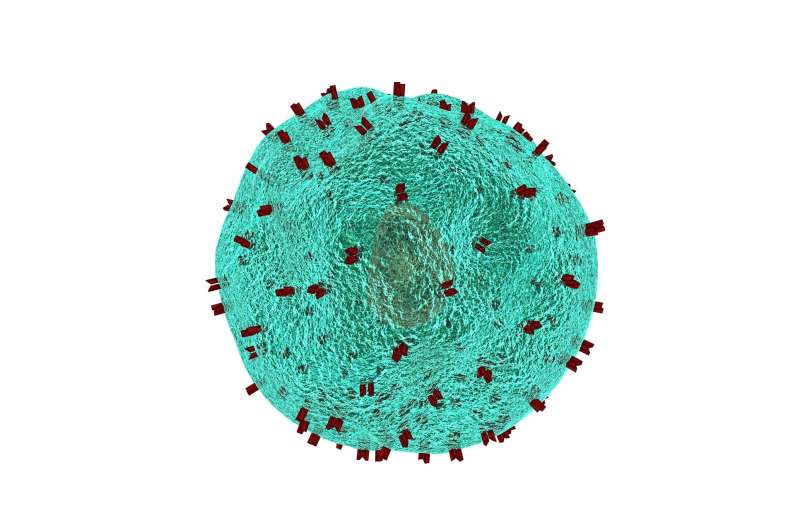This article has been reviewed according to Science X's editorial process and policies. Editors have highlighted the following attributes while ensuring the content's credibility:
fact-checked
peer-reviewed publication
trusted source
proofread
Study reveals inequities in access to CAR T cell therapy

Patients being treated for B-cell non-Hodgkin's Lymphoma (NHL) who are part of minority populations may not have equal access to cutting-edge CAR T cell therapies, according to a new analysis led by researchers from the Perelman School of Medicine at the University of Pennsylvania and published today in NEJM Evidence.
CAR T cell therapy is a personalized form of cancer therapy that was pioneered at Penn Medicine and has brought hope to thousands of patients who had otherwise run out of treatment options. Six different CAR T cell therapies have been approved since 2017 for a variety of blood cancers, including B-cell NHL that has relapsed or stopped responding to treatment.
"CAR T cell therapy represents a major leap forward for blood cancer treatment, with many patients living longer than ever before, but its true promise can only be realized if every patient in need has access to these therapies," said lead author Guido Ghilardi, MD, a postdoctoral fellow in the laboratory of senior author Marco Ruella, MD, an assistant professor of Hematology-Oncology and Scientific Director of the Lymphoma Program.
"From the scientific perspective, we're constantly working in the laboratory to make CAR T cell therapy work better, but we also want to make sure that when a groundbreaking treatment like this becomes available, it reaches all patients who might be able to benefit."
Reducing cancer disparities—differences in incidence, diagnosis, screening, treatment, and outcomes—is a major focus in oncology, with many groups working to understand and address the disparities that patients from certain racial/ethnic and/or socioeconomic backgrounds experience. For example, Black and African American patients have higher death rates than other racial/ethnic groups for many cancer types, including large B-cell lymphoma (LBCL), the most common subtype of NHL.
This study assessed the percentage of patients from minority health populations—defined by the federal government as those who identify as American Indian or Alaskan Native, Asian, Black or African American, and Native Hawaiian or other Pacific Islander—treated for LBCL and the percentage who received CAR T cell therapy at two different cancer centers between 2018 and 2022.
The researchers included data from Penn Medicine's Abramson Cancer Center (ACC) in Philadelphia, where the minority health population prevalence is higher than the United States average, and from the Oregon Health and Science University's Knight Cancer Institute (KCI) in Portland, which has a lower minority population than the U.S. average.
The percentage of minorities with NHL in each center's catchment area (the surrounding countries that make up the primary population served by a health system) mirrored the percentages treated at each center, indicating equitable access to cancer care for the local community in both locations.
However, treatment with CAR T cell therapy was limited for these patients: at the ACC, minority populations accounted for 15.7 percent of LBCL patients treated, but only 6.7 percent of LBCL patients who received CAR T cell therapy. At the KCI, minorities accounted for 6.6 percent of LBCL patients treated, but only 4.2 percent of LBCL patients who received CAR T cell therapy.
While the retrospective study was not designed to determine the cause of these inequities, the researchers theorize that contributing factors could range from clinical barriers (such as other medical conditions) to provider barriers (such as unconscious bias, and/or socioeconomic barriers (such as financial or insurance challenges).
"With any health disparity, gathering evidence and raising awareness is an important first step, but our work on this issue isn't done," Ruella said. "I hope this study prompts the oncology community to think critically about how we can work together to understand and overcome potential treatment barriers so that every patient can receive the best possible therapy for their specific situation and cancer type."
To further the research, Ruella's team is collaborating with Carmen Guerra, MD, the Ruth C. and Raymond G. Perelman Professor of Medicine and associate director of Diversity and Outreach for the ACC, and Jalpa Doshi, Ph.D., a professor of Medicine and senior fellow at the Leonard Davis Institute of Health Economics, to learn more about the key factors and challenges that might limit minority patients' access to CAR T cell therapy.
More information: Guido Ghilardi et al, CAR T-Cell Immunotherapy in Minority Patients with Lymphoma, NEJM Evidence (2024). DOI: 10.1056/EVIDoa2300213

















